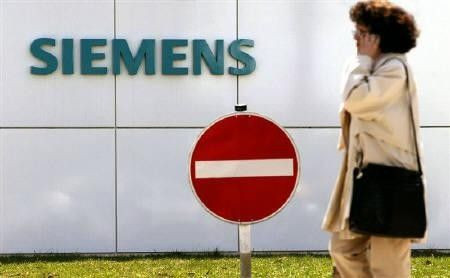Ex-Siemens Execs Charged With Bribing Argentine Officials for $1 Billion Contract

Former Siemens AG executives were charged Tuesday with bribing Argentine officials to land a billion-dollar contract, a scheme that cost the engineering company $1.6 billion in a settlement with the U.S. and Germany.
Federal prosecutors in Manhattan charged eight former executives with Siemens and foreign subsidiaries of committing $100 million to bribe Argentine government officials, members of the opposition party and candidates for office in order to secure a contract for a national identification card project.
The executives were indicted under the Foreign Corrupt Practices Act, a 1977 law prohibiting companies and employees from bribing foreign officials to obtain business.
Business should be won or lost on the merits of a company's products and services, not the amount of bribes paid to government officials, Assistant U.S. Attorney General Lanny A. Breuer said in a statement. This indictment reflects our commitment to holding individuals, as well as companies, accountable for violations of the FCPA.
Argentina launched the bid for its national identification card project in 1994, eventually awarding the $1 billion contract to a Siemens subsidiary.
Prosecutors say the executives relied on 17 off-shore shell companies to disguise and launder the bribes, documenting the payments as sham consulting contracts. When in 1999 a new administration took control of Argentina, the Siemens executives allegedly pumped more bribe money to incoming officials.
After the project was spiked in 2001, the Siemens executives continued the bribery scheme to prevent its disclosure during arbitration proceedings the electronics and engineering giant had initiated to recover lost profits and expenses.
When the project was terminated, they even sought to recover the profits they would have reaped from a contract that was awarded to them illegitimately in the first place, said U.S. Attorney Preet Bharara of the Southern District of New York.
In addition to violating the FCPA, the former Siemens executives were charged with wire fraud and conspiracy to launder money.
A spokesman in Siemen's Munich headquarters did not immediately respond to a request for comment.
Tuesday's indictment credited Siemens with disclosing FCPA violations to the Department of Justice after the Munich Public Prosecutor's office launched a probe.
Siemens in 2008 pled guilty to criminal FCPA violations in regards to securing the Argentine ID card project. Of the $1.6 billion in penalties Siemens and its subsidiaries shelled out, $450 million consisted of criminal fines.
The Securities and Exchange Commission Tuesday filed a parallel civil suit against seven of the eight Siemen executives facing criminal charges.
Business should flow to the company with the best product and the best price, not the best bribe, said Robert Khuzami, director of the SEC's Division of Enforcement. Corruption erodes public trust and the transparency of our commercial markets, and undermines corporate governance.
© Copyright IBTimes 2024. All rights reserved.





















